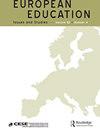18世纪俄罗斯教育的范式,还是超越世俗化的时候了?
IF 0.9
Q4 EDUCATION & EDUCATIONAL RESEARCH
引用次数: 0
摘要
摘要本文考虑了18世纪俄罗斯教育史学的演变,强调了世俗化主导范式的近期转变。它确定了三个广泛的载体:(1)国家作为主要制度建设者的地位;(2)标准化的步伐;(3)“反身性”问题,或揭露学术叙事背后的假设。世俗化的范式忽略了18世纪俄罗斯教育的关键方面,但最近的学术含蓄地挑战了长期存在的模板。本文章由计算机程序翻译,如有差异,请以英文原文为准。
Paradigms of Eighteenth-Century Russian Education, or is It Time to Move beyond Secularization?
Abstract This essay considers the evolution of the historiography of eighteenth-century Russian education, emphasizing recent shifts in the dominant paradigm of secularization. It identifies three wide vectors (1) the place of the state as prime institution builder; (2) the pace of standardization; (3) the problem of “reflexivity,” or laying bare the assumptions underlying scholarly narratives. The paradigm of secularization overlooks crucial aspects of Russian education in the eighteenth century, but recent scholarship implicitly challenges long-standing templates.
求助全文
通过发布文献求助,成功后即可免费获取论文全文。
去求助
来源期刊

European Education
EDUCATION & EDUCATIONAL RESEARCH-
CiteScore
1.20
自引率
0.00%
发文量
5
期刊介绍:
uropean Education is published in association with the Comparative Education Society in Europe (CESE). It is an international peer-reviewed journal devoted to original inquiries and dialogue on education across the member states of the Council of Europe. Established in 1969, the journal features articles on education in individual member states, comparative studies on education across Europe, as well as the impact of European education initiatives globally. The journal especially encourages theoretical and empirical studies, interdisciplinary perspectives, and critical examination of the impact of political, economic, and social forces on education. European Education includes reviews of books and educational films, including those published/produced in English and other languages.
 求助内容:
求助内容: 应助结果提醒方式:
应助结果提醒方式:


